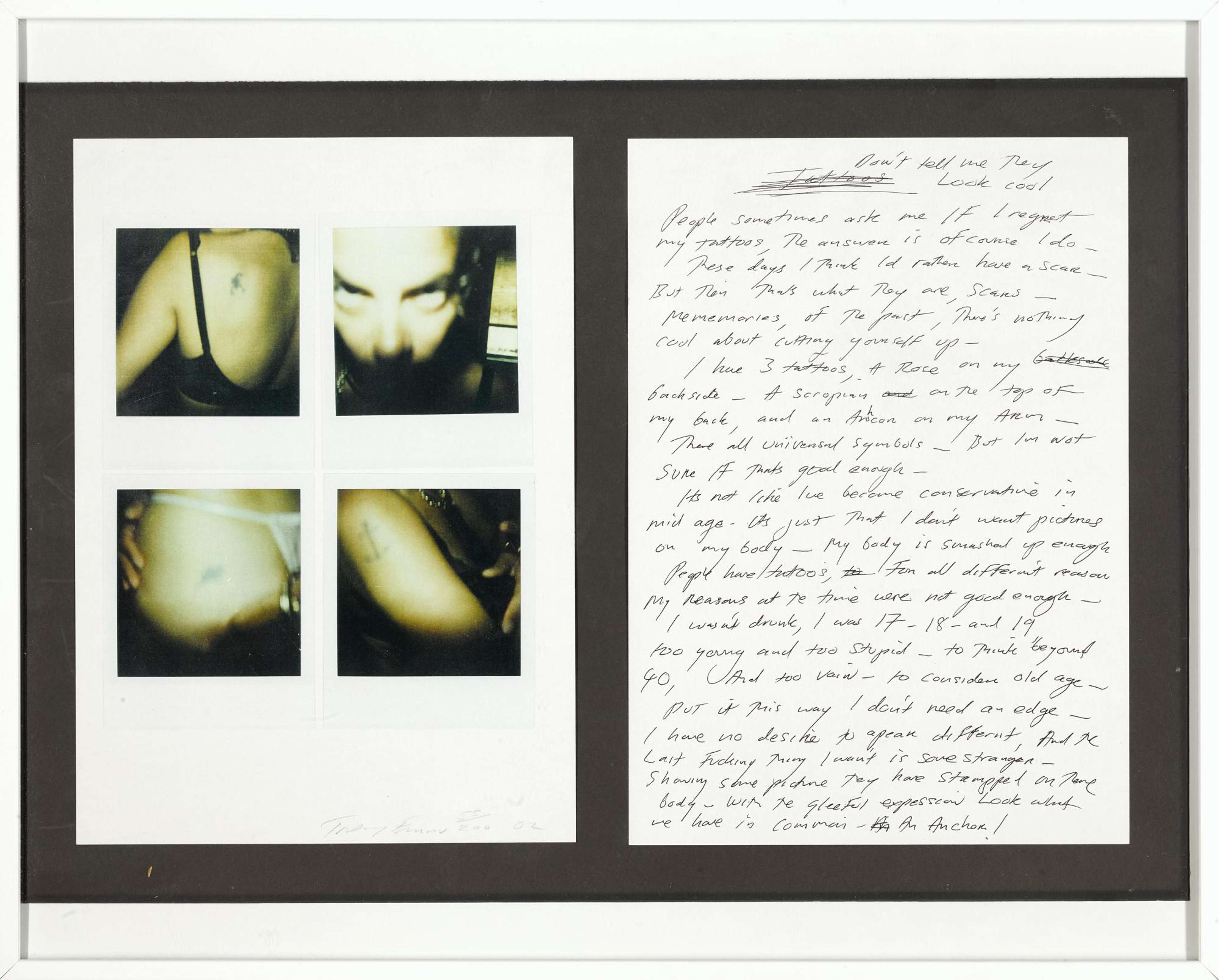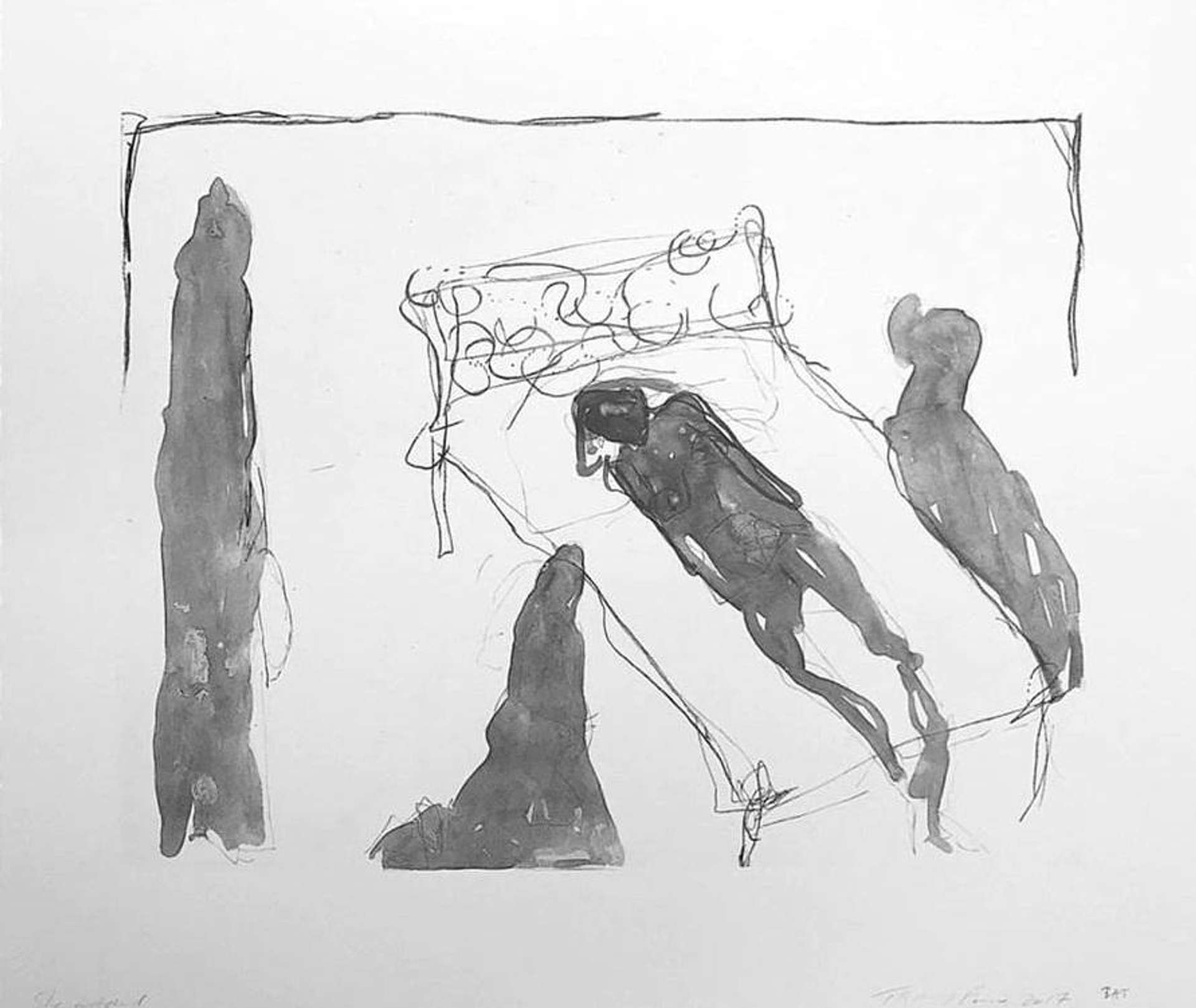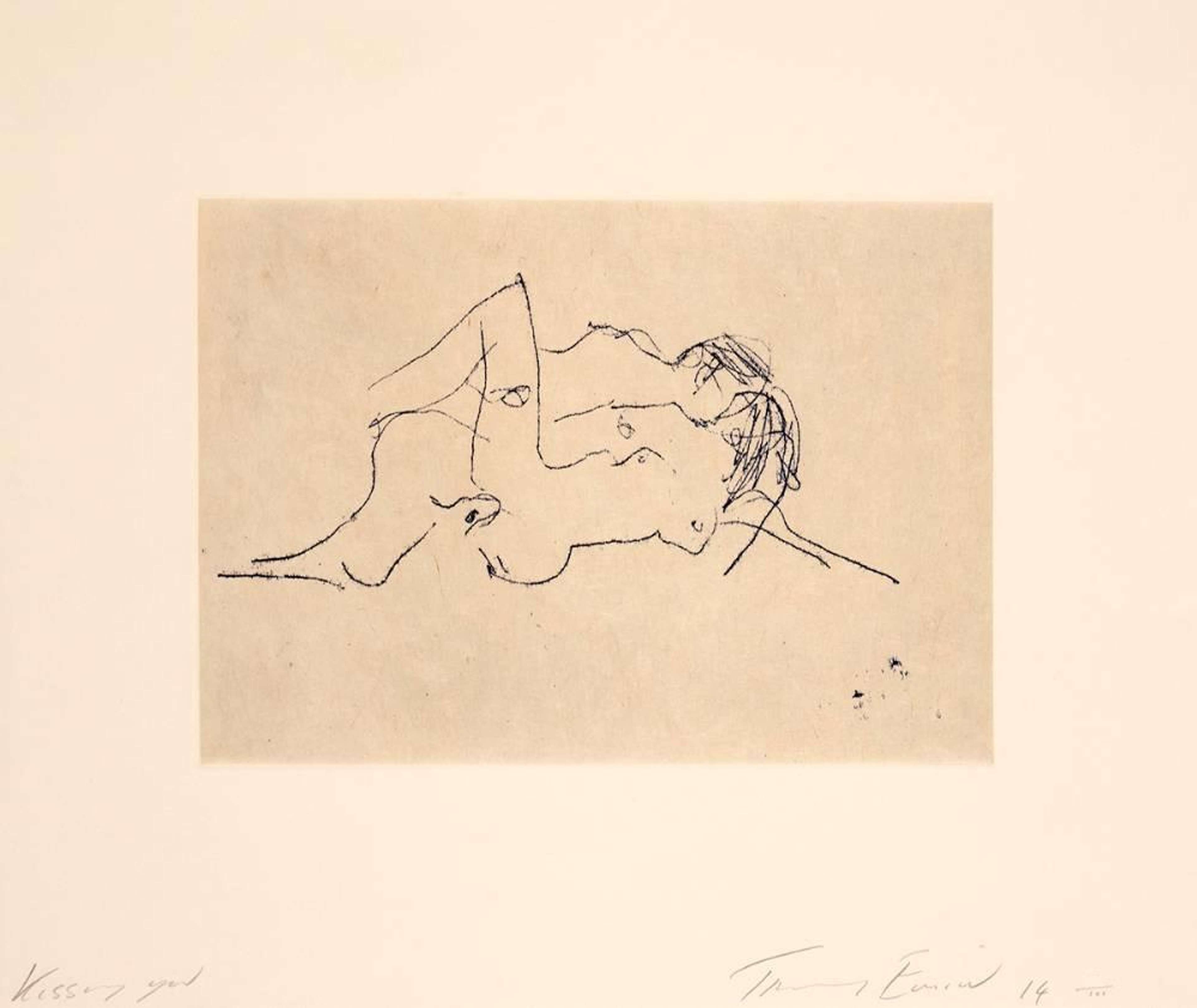From Margate to Manhattan: Charting Tracey Emin's Impact

 Image © Hang-Up Gallery / You Held My Face © Tracey Emin 2018
Image © Hang-Up Gallery / You Held My Face © Tracey Emin 2018
Tracey Emin
142 works
From her early influences in the seaside town of Margate to her rise as a central figure in the art world, Tracey Emin's artistic trajectory has been marked by controversy, raw emotion, and an unyielding commitment to self-expression.
After being catapulted to international fame through her evolution with YBA, her works invited audiences to view her canvas of unfiltered intimacy. From Margate to Manhattan, Tracey Emin's artistic journey is a testament to the power of her art’s ability to emotionally engage and connect with audiences worldwide.
 Image © Kent Online / Like A Cloud Of Blood © Tracey Emin 2022
Image © Kent Online / Like A Cloud Of Blood © Tracey Emin 2022Tracey Emin's Life and Career
Tracey Emin, a prominent British artist known for her raw and emotionally charged works, was born on July 3, 1963, in Croydon, a suburb of London. Raised in Margate, a seaside town in Kent, Emin's early life experiences greatly influenced her artistic journey. Despite a challenging upbringing, she developed a passion for art from an early age, finding solace and self-expression through creativity.
Emin's artistic breakthrough came in the 1990s when she became a central figure in the Young British Artists (YBAs) movement. Known for their provocative and unconventional approaches to art, the YBAs pushed the boundaries of contemporary art in Britain. As part of the YBAs, Emin engaged in a collective spirit of artistic experimentation, collaborating with fellow artists such as Damien Hirst and Sarah Lucas. The movement's ability to shock and challenge traditional norms resonated with audiences, capturing the spirit of the era.
 Image © Tate Modern / My Bed © Tracey Emin 1998
Image © Tate Modern / My Bed © Tracey Emin 1998Emin gained attention and notoriety for her controversial works, most notably her intimate installation piece My Bed. This personal and unapologetic artwork featured her own unmade bed, surrounded by personal items, revealing a candid snapshot of her life. Some critics and audiences questioned its artistic merit, dismissing it as a mere representation of untidiness and personal chaos. The artwork's confrontational nature and explicit references to Emin's personal life made it difficult for some viewers to engage with it beyond its appearance.
In hindsight, it is evident that the installation piece tackled important themes related to mental health and the struggles faced by individuals in contemporary society. It was an unfiltered expression of Emin's own experiences, but it also resonated with a wider audience who could relate to the raw honesty and vulnerability portrayed in her work.
Her artistic practice is defined by her ability in telling other people's truth through her own work. By drawing from her personal experiences, she fearlessly confronts the intricate complexities of the human condition with an unwavering commitment to telling the truth. Her works are prominently displayed in exhibitions all over the world, continually shaping and influencing the landscape of contemporary art.
 Image © White Cube / WET © Tracey Emin 2021
Image © White Cube / WET © Tracey Emin 2021Margate: Emin's Hometown and Creative Hub
Tracey Emin's deep-rooted connection to her hometown of Margate has played a significant role in shaping her artistic journey. In recent years, Margate has undergone a remarkable transformation, emerging as an arts destination, and Tracey Emin has been at the forefront of this revitalization.
For Emin, Margate is more than just a backdrop; it is a source of inspiration and solace. Recognizing the potential of Margate as a creative hub, Emin made a conscious decision to establish a studio and art school in the town, breathing new life into the local art scene. In 2021, Tracey purchased the former Edwardian bathhouse and mortuary, which will be used to display her works, to create TKE Studios. It provides space for exhibitions, artist studios, and welcomes visiting tutors for a well-rounded program. Tracey was able to secure millions to fund the studio through her sale of Like A Cloud Of Blood, a piece she developed after receiving cancer treatment.
 Image © White Cube / Only Room In My Mind For You © Tracey Emin 2020
Image © White Cube / Only Room In My Mind For You © Tracey Emin 2020Emin's presence in Margate has contributed to its artistic renaissance. Her commitment to the town's cultural development has helped attract fellow artists, creative enterprises, and visitors. Margate has become a thriving hub for contemporary art, with galleries, independent art spaces, and events showcasing a vibrant artistic community. Her commitment extends beyond the art world; it is a testament to her love for the town and her desire to give back to the community that nurtured her talent. Through her new initiatives, she has reinvigorated Margate, leaving her mark on the town's cultural landscape and ensuring that it remains a vibrant centre for artistic expression.
The town’s seaside nostalgia is proving to be a centre for economic as well as cultural expansion. Margate’s reputation as a creative coastal hub continues to grow with Emin’s help in addition to new developments and partnerships like the one between Turner Contemporary and Kent County Council fostering a £1.782 million capital project.
Global Inspirations: Tracey Emin's Impact Beyond Margate
Emin’s artistic impact extends far beyond her hometown of Margate, as her work resonates on such a global scale. From London to Istanbul, her vulnerable pieces have taken her to diverse corners of the world, transcending borders and touching the hearts of individuals worldwide.
London
Emin's move to London marked a pivotal moment in her artistic journey, as the vibrant city played a significant role in shaping her artistic identity. The cosmopolitan and culturally rich environment provided Emin with a fertile ground to explore her creativity and push the boundaries of her art. Emin's association with the YBAs allowed her to collaborate with and be influenced by some of the most prominent artists of her generation, encouraging experimentation on taboo subjects, ultimately shaping the nature of Emin's work.
Everyone I Have Ever Slept With 1963-1995 is a seminal work by Emin that invites contemplation on the complexities of human connection and the intimate moments that shape our lives. Consisting of a tent carefully embroidered with the names of all the people Emin had shared a bed with, the artwork serves as a visual representation of the artist's personal history and the myriad relationships she has experienced. Emin uses her tent to call attention to the intricate web of relationships, transcending mere sexual encounters. Beyond the surface level of the art, it sparks contemplation about identity, vulnerability, and the fragility of human bonds. She challenges conventional notions of privacy, encouraging viewers to reflect on the significance of personal histories and the impact of intimate relationships on our sense of self.
More recently, her work was featured in collaboration with Edvard Munch’s works for their 2021 exhibition, The Loneliness Of The Soul. While the exhibition is focused on a revolving door of feelings experienced by the soul, art critic Waldemar Januszczak uses words like risky and wild to describe Tracey's expressive paintings.
Hong Kong
Before taking a sabbatical, Tracey’s solo debut I Cried Because I Love You launched in Hong Kong during Art Basel. Her tapestry, neons, and paintings were all on display across the White Cube and Lehmann Maupin galleries as she told a story informed by her body and new perspective on relationships, acquired after marrying a stone.
Venice
In 2007, Emin exhibited Borrowed Light at the Venice Biennale where she openly explores her experience of being overwhelmed by an influx of emotions all at once. This was a historical moment for Emin given she’s only the second woman to present at the British Pavilion.
Paris
In 2019, Emin’s curated drawings found themselves in the City of Lights. Her exhibition, The Fear Of Loving. Orsay Through The Eyes Of Tracey Emin, at the Musée d’Orsay was her first event held at a major French institution. Her selected works shined a light on the realities of love, life, and the anxieties we face because of them.
Themes that Transcend Borders: Emin's Universal Language of Emotion
Utilising confessional text, neon lights, and embroidery, Emin crafts a raw and sincere portrayal of her own experiences, inviting viewers to confront their own emotions and stories.
While her approach to art-making has drawn comparisons to feminist artists of the 1970s and other practitioners employing similar techniques, Emin's work remains distinctive in its unapologetic and empowering nature. The confessional texts form a significant component of Emin's creative practice. Tracey has rejected the stereotype of the polite and modest woman, embracing a "bad girl" persona that the public has both critically and receptively embraced. With openness and candour, she shares her experiences of abuse and neglect, translating those scars into visual representation to present a poetic depiction of the pain and isolation often associated with trauma.
 Image © Google Arts and Culture / Psycho Slut © Tracey Emin
Image © Google Arts and Culture / Psycho Slut © Tracey EminEmin’s 2011 retrospective at London’s Hayward Gallery displayed her neon, quilt, and multimedia works, in a fashion that resembled a more playful approach to her traditionally provocative art. Love Is What You Want was a complex yet romantic and introspective account of Emin’s experiences of sexual assault, heartbreaks, and finding love again. Her quilt Psycho Slut is an appliqued diary of her encounters with sex, abortion, and abuse- subjects she has masterfully approached and depicted in her work. The light pink and orange colours help create a beautiful distraction and juxtaposition against the piercing language visible on the quit.
Emin's work and technique share notable similarities with her mentor, Louise Bourgeois, who had a profound influence on her artistic development. Both artists explore deeply personal and emotive subject matter, using their art as a means of catharsis and self-expression.
Emin and Bourgeois both employ a confessional approach in their work, tapping into intimate and often painful experiences. They draw upon their personal histories to create art that confronts vulnerability, trauma, and the complexities of human relationships. While Emin's art often includes autobiographical elements and explicit narratives, Bourgeois takes a more symbolic and abstract approach, using objects and forms as metaphors for her emotional experiences.
Both artists are able to demonstrate a keen sensitivity to materials. Emin frequently incorporates found objects, personal belongings, and fabrics into her artworks, infusing them with a sense of history and personal significance. Bourgeois, too, utilises diverse materials in her sculptures, including wood, marble, bronze, and fabric, often manipulating them to expose deep-rooted emotions or psychological states.
Emin's Influence on Contemporary Art
Emin has had a profound and lasting impact on contemporary art, influencing younger generations of artists and shaping art movements. Her contributions to feminist art and the representation of women have been significant, and her legacy continues to resonate in the art world today. Through her unfiltered works, Emin has challenged conventions and opened doors for marginalised voices to be heard.
Her impact can be seen in the works of artists like Phoebe Boswell, whose multidisciplinary approach and intimate storytelling echo Emin's introspective art style. Boswell's artwork, such as For Every Real Word Spoken, focuses on themes of identity and belonging, and presents the female body to not only examine at the surface level, but for its viewers to recognise where and how they place value on them, drawing inspiration from Emin's ability to confront personal truths and connect with viewers on a profound level.
Emin's legacy extends beyond her individual artworks. As a prominent figure in the art world, she has used her platform to advocate for greater inclusivity and representation. She has mentored emerging artists, providing guidance and support, and has actively engaged with the art community through talks, exhibitions, and collaborations. Her commitment to nurturing the next generation of artists and challenging established norms emphasising her unwavering impact on the art world. Tracey’s ongoing relevance speaks to her ability to provoke dialogue and connect with viewers and artists on a personal level.
Lasting Cultural Significance
Through her unapologetic approach to addressing female sexuality and experiences, she has opened doors for women artists to explore themes that were once considered taboo. Traditionally, female sexuality has often been depicted through the male gaze in art, objectifying women and reducing their experiences to passive subjects. However, Emin's work subverts these expectations by presenting female sexuality and experiences from a deeply personal and subjective standpoint. Her fearless visualisation of love, desire, trauma, and the female body, has paved the way for a new generation of women artists to explore and reclaim their own narratives.
Tracey Emin's journey from Margate to the international art scene has been a transformative one. From London to Venice, Hong Kong to Paris, her works have been showcased in major art institutions, exhibitions, and galleries. Through her use of confessional text, neon lights, and embroidery, Emin crafts a raw and sincere portrayal of her own experiences, inviting viewers to confront their own emotions and stories.
Where to See Emin in 2025/2026
See Tracey Emin’s landmark show at Tate Modern from 26 February to 31 August 2026. Spanning 40 years of work, it brings together career-making moments - including the Turner Prize–nominated My Bed (1998) - with pieces never shown before. Across painting, video, textiles, neon, writing, sculpture and installation, Emin’s confessional voice explores love, trauma and recovery, reaffirming her lifelong commitment to painting and her pivotal place in contemporary British art.













